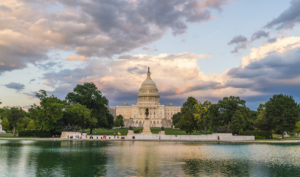
President Trump sets a deadline for eliminating advisory committees, EPA repeals the Obama Administration’s Clean Power Plan, and more…
IN THE NEWS
- President Donald J. Trump ordered federal administrative agencies to evaluate the need for each of their advisory committees and eliminate at least one third of those committees by September 30, 2019. The order includes a number of exemptions, such as for agencies with fewer than three committees or for committees that provide scientific advice on “the safety or efficacy of products to be marketed to American consumers.” Gretchen Goldman, research director at the Center for Science and Democracy, criticized the order as minimizing “the possibility of even making decisions based on robust science advice.”
- The U.S. Environmental Protection Agency (EPA) repealed the Obama Administration’s Clean Power Plan (CPP) and replaced it with the Affordable Clean Energy (ACE) rule, which establishes federal guidelines for carbon dioxide emissions reductions at U.S. coal-fired power plants. Unlike the CPP, which established mandatory emissions reductions targets for coal-fired power plants, ACE will allow each state to determine what level of emissions reductions are reasonable and what methods the state will use to achieve the reductions. EPA claimed that the CPP “exceeded EPA’s statutory authority under the Clean Air Act” and stated that ACE “restores the rule of law and empowers states to continue to reduce emissions while providing affordable and reliable energy for all Americans.” Glen Hooks, director of the Arkansas Sierra Club, promised to challenge the rule, calling it “an immoral and an illegal attack on clean air, clean energy, and the health of the public.”
- The U.S. Supreme Court held 5–3 that the Sex Offender Registration and Notification Act (SORNA)—which grants the Attorney General the power to “specify the applicability of” the Act to convicted sex offenders—does not violate the so-called non-delegation doctrine limiting how much policymaking authority Congress constitutionally may delegate to other branches of government. Justice Elena Kagan, whose plurality opinion was joined by Justices Stephen Breyer, Ruth Bader Ginsberg, and Sonia Sotomayor, cautioned the Court to exercise “wisdom and humility” in reviewing necessary government programs and noted that “if SORNA’s delegation is unconstitutional, then most of government is unconstitutional.” Justice Samuel Alito concurred in the judgment only, but indicated that if “a majority of this Court were willing to reconsider the approach we have taken for the past 84 years, I would support that effort.” In dissent, Justice Neil Gorsuch argued that SORNA effectively grants the Attorney General “the power to write his own criminal code” and advocated a stricter interpretation of the non-delegation doctrine. Justice Brett Kavanaugh did not participate in the decision.
- The U.S. Supreme Court held that the Fifth Amendment of the U.S. Constitution does not protect individuals from being successively prosecuted for the same offense by a state and by the federal government. Upholding the so-called dual sovereignty exception, Justice Samuel Alito wrote that the Double Jeopardy Clause of the Fifth Amendment protects against successive prosecution for violations of the same sovereign’s law, not for the same conduct. Justice Neil Gorsuch dissented, arguing that “a free society does not allow its government to try the same individual for the same crime until it’s happy with the result.”
- The Supreme Court ruled that the First Amendmentof the U.S. Constitution does not apply to private nonprofit companies that offer public-access television channels because they do not serve a public function. Justice Brett Kavanaugh analogized cable companies to private companies that provide platforms for speech similar to how “comedy clubs host open mic nights.” In dissent, Justice Sonia Sotomayor highlighted that cable companies had a constitutional responsibility, writing that “a comedy club can open its doors as wide as it wants, but it cannot appoint itself as a government agent.”
- Facebook announced plans to launch a new blockchain-based cryptocurrency system called Libra. Hoping to address concerns over prior data breaches, Facebook will manage the Libra network through Calibra, a regulated subsidiary, which will be jointly governed by several corporate partners and will maintain a division between the social media platform and the cryptocurrency network. House Financial Services Committee Chair Maxine Waters (D-Calif.) expressed concern that Libra may represent a threat to consumer data and asked Facebook to delay “developing a cryptocurrency until Congress and regulators have the opportunity to examine these issues and take action.”
- Canadian Prime Minister Justin Trudeau announced that his government has approved the Trans Mountain Expansion (TMX) pipeline, which if built will carry crude oil from Alberta’s tar sands to the Pacific coast for export to the United States and Asia. “The TMX project is a significant investment in Canadians and in Canada’s future that will create thousands of good, middle class jobs, maintain the highest environmental standards, and fund the clean energy solutions that Canada needs to stay competitive on the global stage,” Trudeau said. Chief Leah George-Wilson of the Tsleil-Waututh First Nation reportedly promised to appeal the decision, stating that “our obligation is to the land, to the water, to our people, to the whales.”
- The Federal Aviation Administration (FAA) announced new plans to reduce noise restrictions for domestic testing of commercial supersonic aircraft. In allowing increased takeoff and landing noise on U.S. soil, the FAA wants to ensure U.S. companies are competitive in supersonic research and development. An FAA spokesperson reportedly said the new plan will be “the first of several regulatory actions planned by the FAA to help enable the reintroduction of civil supersonic flight.”
- Acting U.S. Secretary of Defense Patrick Shanahan resigned and withdrew his name from consideration to be the next permanent Secretary. Shanahan’s decision follows new allegations that he was involved in physical altercations with his ex-wife and that he defended his 17-year-old son in 2011 after the youth struck his mother repeatedly with a baseball bat.
WHAT WE’RE READING THIS WEEK
- The scientific integrity of U.S. agency decision-making may be under threat, according to an essay by professor Thomas McGarity of the University of Texas at Austin School of Law in the American Constitution Society’s publication, Rethinking Admin Law: From APA to Z. McGarity argued that politically appointed policymakers regularly attempt to manipulate agency science, both by exercising their power to direct or ignore scientists and by altering internal procedures to make it more difficult to develop and use science in agency decision-making processes. To combat the problem, McGarity suggested that agencies build institutional “firewalls” around scientific assessment processes and establish an independent scientific integrity office to watchdog the process.
- Alina Polyakova of the Brookings Institution and Daniel Fried of the Atlantic Council published a new edition of their report on democratic responses to foreign disinformation. The authors evaluated recent government and social media company policy responses to foreign disinformation as indices of a growing willingness to engage in trial and error attempts to confront the problem. Polyakova and Freed described these attempts as essential given the continued growth and adaptation of the disinformation threat.
- In a New York Times column, David Leonhardt analyzed a recent report from the U.S. Department of Transportation that demonstrated a declining fatality rate from car accidents in the United States. Noting that distracted driving played a significant role in the previous increase in automobile fatalities, Leonhardt attributed the reversal to new technology that mitigates errors from distracted drivers. He cited technology that takes over when drivers make mistakes and automatic braking as solutions that should receive wider attention.



